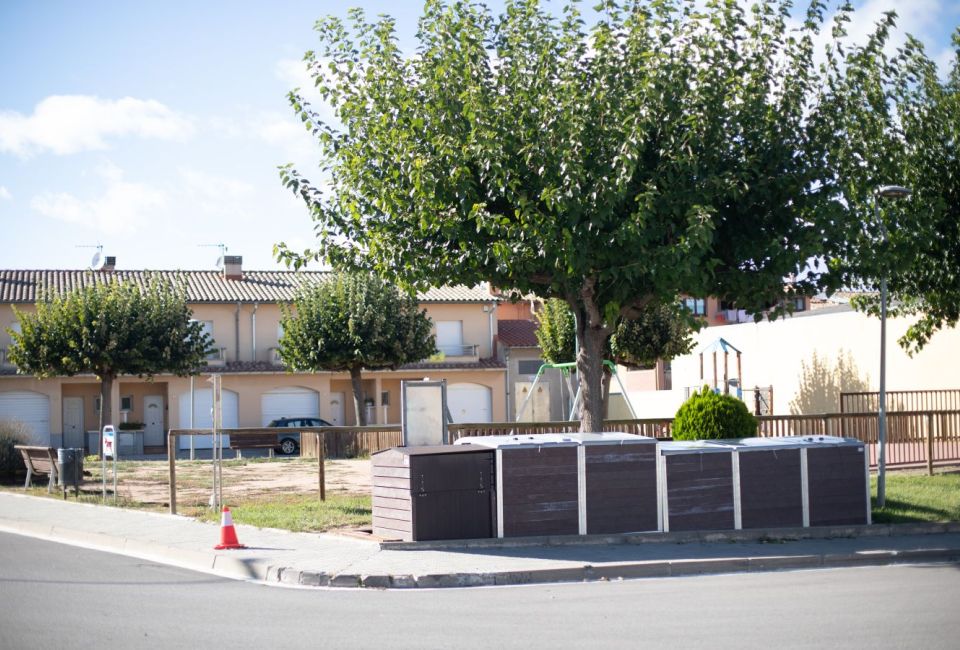Community composting can rapidly improve organic waste recycling performance
Beyond Catalonia, the DECOST project has been able to promote similar experiences of community composting in Palestine, Jordan and the Italian region of Basilicata.

The European research project DECOST (Decentralized Composting in Small to Medium Towns), coordinated by the BETA Technology Centre of the University of Vic-Central University of Catalonia (UVic-UCC), ends having consolidated its model of municipal organic waste management based on a system of community composters. The project has demonstrated its rapid effectiveness in improving recycling figures. The activity of the pilot tests in Les Masies de Roda (since 2020) and in the neighbourhoods of Sant Llàtzer and Quatre Estacions de Vic (since 2021) has meant that during these years up to 500 tonnes of organic matter and pruning generated in both municipalities have been treated, providing a service to 2,420 inhabitants. This material has resulted in the production of 250 tonnes of compost, which has been distributed among the same neighbourhoods that have participated in DECOST.
In the municipality of Les Masies de Roda, where, in addition to the door-to-door selective collection that was implemented in the municipality, the first pilot test of the project was carried out, the community composting proposed by DECOST has made it possible to treat all the organic waste produced in the town. Specifically, it has gone from 15% recycling of organic matter to 31%, there has been a reduction in mixed waste from 53% to 18% and the waste fraction has been reduced by 75%. The results of the project have been so positive that Les Masies de Roda has definitively incorporated community composting into its collection model and will assume its direct management.
In the Sant Llàtzer and Quatre Estacions neighbourhoods of Vic, four community composting points were installed, each with a space for pruning and six composters (two for pruning and four for maturing). In this part of the municipality, where one of the main objectives was to support the management of the green fraction (pruning and garden waste) and offer citizens an alternative, the results have also been very satisfactory. In the county of Osona, these experiences have contributed to the fact that the new county contract with the waste collection company already includes community composting as one of the possible options to be taken into account, “which shows that our work will last in the territory”, says Joan Colón, researcher at CT BETA and coordinator of DECOST.
An experience that can be extrapolated to the Mediterranean
Beyond Catalonia, the DECOST project has been able to promote similar community composting experiences in Palestine, Jordan and the Italian region of Basilicata. Colón explains that “the challenge is the same, but each pilot test is unique, because the realities throughout the Mediterranean area are very different”. In this sense, he adds that “it has been necessary to work very directly with local administrations to offer a useful and adapted response to each country”.
The aim of the DECOST project is to create closed and decentralised community composting systems as the main method of municipal organic waste management in towns in the Mediterranean region. In this system, municipalities and neighbourhoods have a key role to play in valorising organic waste and providing an outlet for it through urban agriculture projects. According to Colón, “few European projects have an application so focused on the reality on the ground and such a vocation for permanence”.
The DECOST project has involved eight partners from six Mediterranean countries: Apart from CT BETA, the consortium includes Università Politecnica delle Marche and Ente di Governo Rifiuti e Risorse Idriche Basilicata, from Italy ; the University of Patras, from Greece; the Irbid Agriculture Directorate and the Jordan University of Science and Technology, from Jordan; the Galilee Society (Arab National Society for Health Research and Services), from Israel; and the Palestine Technical University Kadoorie, from Palestine. The three-year project has been funded by the European Union through the ENI CBC Mediterranian Sea Basin Programme, which has contributed €2.7 million, 90% of the total budget of €3.1 million.
The BETA TC is working to capitalise on DECOST experience in the field of waste management through another European project, MED4Waste. In parallel, the same centre will soon start to disseminate a scientific advisory service for city councils and local governments in the framework of the European Commission’s Science Meets Regions programme.
